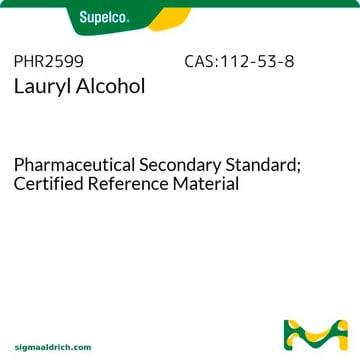126799
1-Dodecanol
reagent grade, 98%
Synonym(s):
Alcohol C12, Dodecyl alcohol, Lauryl alcohol
About This Item
Recommended Products
grade
reagent grade
Quality Level
vapor density
7.4 (vs air)
vapor pressure
0.1 mmHg ( 20 °C)
Assay
98%
form
solid or liquid
autoignition temp.
500 °F
expl. lim.
4 %
refractive index
n20/D 1.442 (lit.)
bp
260-262 °C (lit.)
mp
22-26 °C (lit.)
solubility
water: slightly soluble 1 g/L at 23 °C
density
0.833 g/mL at 25 °C (lit.)
SMILES string
CCCCCCCCCCCCO
InChI
1S/C12H26O/c1-2-3-4-5-6-7-8-9-10-11-12-13/h13H,2-12H2,1H3
InChI key
LQZZUXJYWNFBMV-UHFFFAOYSA-N
Looking for similar products? Visit Product Comparison Guide
General description
Application
Signal Word
Warning
Hazard Statements
Precautionary Statements
Hazard Classifications
Aquatic Acute 1 - Aquatic Chronic 1 - Eye Irrit. 2
Storage Class Code
11 - Combustible Solids
WGK
WGK 2
Flash Point(F)
249.8 °F - closed cup
Flash Point(C)
121 °C - closed cup
Certificates of Analysis (COA)
Search for Certificates of Analysis (COA) by entering the products Lot/Batch Number. Lot and Batch Numbers can be found on a product’s label following the words ‘Lot’ or ‘Batch’.
Already Own This Product?
Find documentation for the products that you have recently purchased in the Document Library.
Customers Also Viewed
Our team of scientists has experience in all areas of research including Life Science, Material Science, Chemical Synthesis, Chromatography, Analytical and many others.
Contact Technical Service










